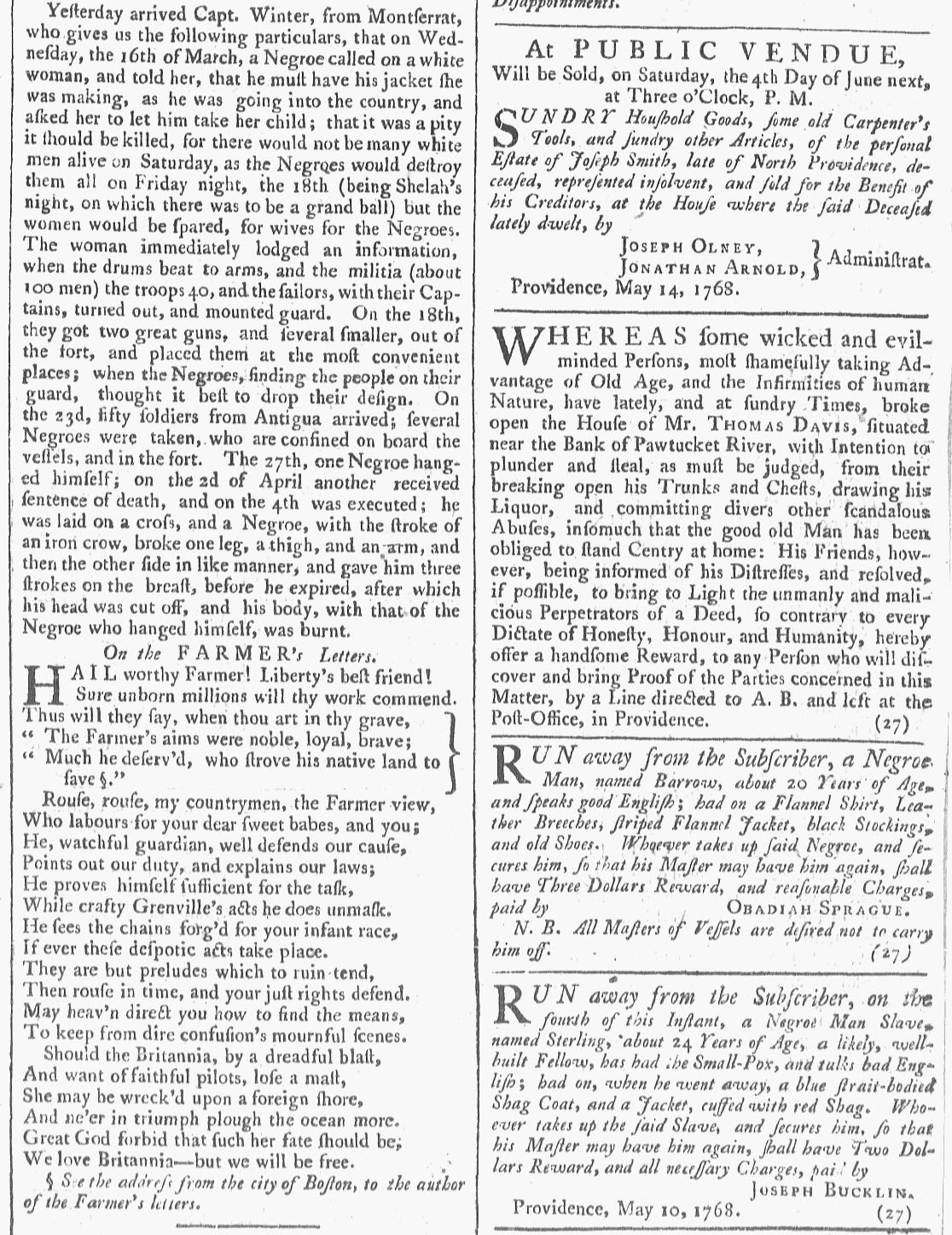Who were the subjects of the newspaper advertisement in a colonial American newspaper 250 years ago today?

“RUN away … a Negroe Man Slave, named Sterling.”
Most of the advertisements in the May 14, 1768, edition of the Providence Gazette had appeared in at least one previous issue, but Obadiah Sprague and Joseph Bucklin inserted two new notices. Both notified readers about runaway slaves, providing descriptions and offering rewards for capturing and returning them. A “Negro Man Slave, named Sterling” who “talks bad English” ran away from Bucklin. A “Negroe Man, named Barrow” who “speaks good English” ran away from Sprague.
Considered on their own, each of these advertisements testifies to the choices made by many enslaved men and women, even though their stories have been filtered through narrators who held them in bondage. Sterling and Barrow did not accept their lot; instead, they took action to gain their freedom rather than remain enslaved. Sprague suspected that Barrow might even attempt to board a ship and make good on his escape by putting as much distance between himself and his former master as possible.
Considered in relation to other items on the same page, these advertisements reveal juxtapositions in colonists’ understandings of liberty at the time of the imperial crisis that preceded the American Revolution. These notices concerning runaway slaves appeared immediately to the right of a poem, “On the FARMER’s Letters.” The ode honored John Dickinson, the pseudonymous “Farmer,” who had written a series of letters defending the colonies against abuse by Parliament in the wake of the Townshend Act. The letters had been reprinted in newspapers throughout the colonies. The poem described the “Farmer” as “Liberty’s best Friend!” It concluded by proclaiming, “We love Britannia – but we will be free.” To modern eyes, such declarations seem starkly contradictory when positioned next to advertisements inserted expressly for the purpose of returning runaway slaves to bondage. Yet they reveal that most colonists did not think of their freedom in the same terms that they considered the condition of enslaved men, women, and children.
This contrast seems even more stark when taking into account the news item printed immediately above the poem. In a paragraph comprised of approximately the same number of lines of text, the printers reported on news that had just come to hand via “Capt. Winter, from Montserrat.” It told of an attempted slave revolt, one that required fifty soldiers from Antigua to put down. The narrative of events concluded with a gruesome description of the torture and execution of one of the insurrection’s leaders. With no transition at all, this tale gave way to the poem extolling the Farmer’s efforts to protect colonists’ liberty.
Most colonists held contradictory views when it came to their own liberty compared to the liberty of slaves. Barrow, Sterling, and other runaways, on the other hand, were not conflicted in their views on the matter. They did not need a series of letters from the “Farmer” to explain enslavement to them, yet some likely felt bolstered in their decisions to determine their own fates as they listened to debates about liberty that intensified during the imperial crisis. They likely also heard about the brutal measures taken to quell slave revolts, making their choice to escape from their masters all the more courageous for knowing the consequences that others faced when they engaged in acts of resistance.

